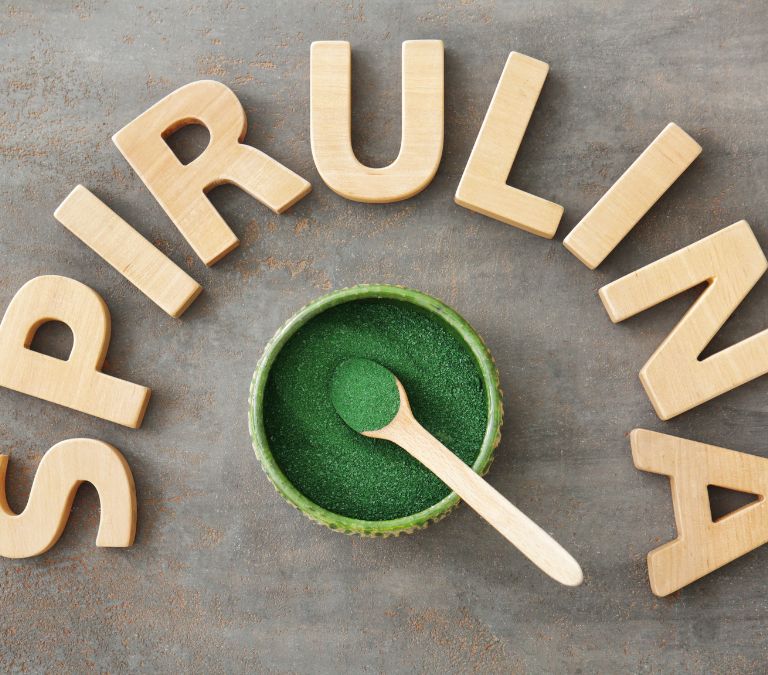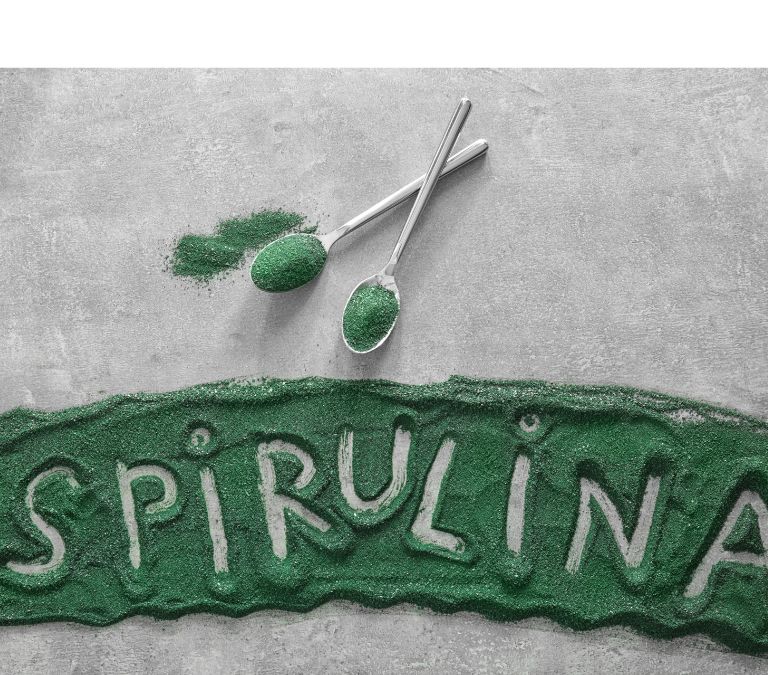I remember vividly this time seven years ago when I started experiencing signs of menopause. I was overwhelmed! The symptoms came all too sudden and unexpected, but I was able to manage them until I finally got into my menopause stage.
Menopause made me realize the importance of healthy dieting. Before now, I ate junk food, from spicy to fatty foods, fried foods, cakes, snacks, and sometimes alcohol.
While all these can be good, taking too much of the excess consumption of such foods can be detrimental. I ate all these often because the nature of my job wouldn’t let me.
I had to quit the job and delve into nutrition. As a nutritionist, I have discovered many tremendous benefits of a good diet. Do you know you could eat your way out of painful menopausal symptoms? An exceptional food called spirulina could save you from the troubles of menopausal symptoms.
Think about it; imagine having a symptom-free menopause life by simply eating right. How? Well, I’m glad you asked, and you’ll learn how and much more in this article. I must warn you, though, that this food may be unfamiliar to you, but by eating it, you can avoid all the symptoms that come with the change that menopause brings.
On average, menopause starts from 45 to 50, but your transition stage, also known as perimenopause, usually begins in your early 40s or 30s. Menopause occurs when your estrogen and progesterone decline to a point where your period stops completely.
Of course, you should know that it’s neither a disease nor a defect, but a natural stage of our lives as women!
Symptoms of Menopause
Start with menopause has three stages; Perimenopause, Menopause, and Postmenopause. Below are the symptoms to look out for as you enter your menopausal stage.
Perimenopause Stage
Hot flashes, Irregular periods, Weight gain/loss, Acne, Irritability, forgetfulness, Depression
Menopause Stage
Vaginal dryness, Hot flushes, Loss of libido, Palpitations, lack of sleep, wrinkles, etc
Post-Menopause Stage
Hot flashes, Insomnia, Dry skin, weight changes, depression, sexual discomfort which is also known as Dyspareunia, changes in sex drive, vaginal dryness, etc.
With all that I will share in this article, you’ll see how I managed my health through menopause without hormone replacement therapy (HRT).
I only suffered from occasional hot flashes when I drank too much coffee.
The conventional HRT also has its health scares. When it is stopped, your menopausal symptoms usually come back, this time more severe than before, and you can’t stay on HRT forever.
It’s just like using a steam roller to crush a nut. So before you try other ways of dealing with your symptoms, you should try my suggestions and the other natural treatments.
HRT is not safe for every woman. Women with underlying issues such as breast cancer, hormone cancer, and other diseases cannot take HRT, but spirulina works for all and sundry.
Many women have less trouble from menopausal symptoms when they take spirulina. You may begin to feel calmer, more energetic, and in balance. You will also have less bother from hot flashes.
Introducing Spirulina

Have you ever heard of spirulina? No? I’ll have you know that spirulina is among the most popular dietary supplements. It is loaded with various nutrients and antioxidants that are beneficial to your body and brain.
Spirulina is a photosynthetic filamentous cyanobacterium with microscopic dimensions. It naturally grows in the highly-salted alkaline lakes like those found in Africa, America, Asia, and Mexico. It is a cyanobacterium belonging to single-celled microbes, often called Blue-green Algae.
Spirulina, in plain terms, is a kind of algae or small plant that grows in or near lakes and does not have leaves or roots. When dried, spirulina can be taken as food or added to food, and it is an excellent source of vitamins, minerals, and protein.
Reports have shown that the consumption of spirulina in women could prevent and manage metabolic syndrome components. Metabolic disorders are more present during menopause.
What does spirulina contain?
Over the years, it has been evident that spirulina appears to be an alternative treatment for menopause, and research suggests that it can help to mitigate the symptoms of menopause. Spirulina is fantastic for your cardiovascular health too.
It is said to be very rich in vitamin A and antioxidants. It makes it an excellent superfood for cleansing your body and enhancing the integrity of your aging skin.
Spirulina is also known for its protein abundance. It has natural protein content, and the amount is so rich that it contains more protein than any other sources like fish, chicken, beef, or pork. The protein nutrients in spirulina are even higher than in soybeans; soybeans also have natural protein.
Spirulina has essential amino acids in abundance! Your body can’t produce essential amino acids on its own. So, you can get them from food sources like spirulina. Making spirulina part of your diet will help you build solid muscles and ease body pains.
Essential amino acids are also helpful because they are like the building blocks of most of your hormones. Spirulina cells do not have cellulose, making it easier for your body to absorb the nutrients in spirulina.
I discovered that spirulina is an excellent superfood to control weight during menopause, and this helped me check and maintain my weight during my transition into the menopausal world.
Spirulina is also believed to be an excellent source of energy and eye vitamin, capable of improving the integrity of the nerves in your body. It possesses the ability to enhance a person’s overall health in terms of boosting the integrity of the immune system.
One of the critical components of Spirulina is Anthocyanins. It gives off the bluish color of the superfood. Anthocyanin increases the white blood cells in your bloodstream, responsible for fighting off diseases and infections your body may be exposed to. It is one of the ways spirulina helps improve your body’s immune system.
Does spirulina have side effects?

Spirulina appears to be safe, even when high doses are taken. Although, there could be some precautions and possible interactions.
According to the manufacturer’s instructions or the doctor’s prescription, it is always advisable to take spirulina supplements.
Due to the green color from its chlorophyll, consuming spirulina may cause green discoloration of your stools. When you take spirulina, it acts as a detoxifying agent. Here, the best advice is to start taking weaker doses first to get your body used to the effects of spirulina. Afterward, you can go on to take higher doses as prescribed by your doctor.
As spirulina has many excellent benefits, it is essential to know that this super supplement is not always 100% free from toxins and contaminants. Spirulina may have some harmful toxins like bacteria or microcystins.
People with phenylketonuria (PKU) are strongly advised to avoid spirulina. Since the phenylalanine in spirulina can make a phenylketonuria patient’s case worse.
Generally, spirulina is considered safe, but contaminated samples could cause rapid medical cases such as rapid heartbeat, shock, vomiting, liver damage, and weakness.
All of these dangers are pretty rare. It denotes that the positive outcomes of spirulina outweigh the negative results.
Benefits of Spirulina for menopause
Let us take a look at how spirulina can help you with every symptom you face during menopause:
Hot Flashes
One of the most common symptoms of menopause is hot flashes and mood swings, and you almost cannot escape it. However, the contents of spirulina serve as a calming and soothing agent, which, when taken, helps you get a calmer yet more energetic day.
When I first observed my perimenopause symptoms, they began with hot flashes and night sweats. It was so uncomfortable and depressing, and I couldn’t sleep and would go through the day in so much uncertainty as to when my next hot flash would come again. It was frustrating!
Having taken spirulina, I now have less trouble from menopausal symptoms like hot flashes. I feel calmer, certainly more energetic, and in balance, or should I say control.
It has been attributed to spirulina’s high amounts of gamma-linolenic acid. It is a fatty acid that transforms into prostaglandins, a precursor to calming hormones.
Reports indicate that after taking spirulina, women feel calmer, save more energy, have less painful breasts, have less premenstrual syndromes, and have fewer hot flashes.
Think about it for a second; you get to escape the pain and discomfort that hot flashes bring. No more night sweats either. All these benefits are enjoyed by eating right and including spirulina in your meal. What more could you possibly ask for?
Irregular Periods
Ahhh, yes, the most pronounced symptom of menopause. Irregular periods could confuse and worry you about your body and overall health.
Sometimes your period may come late, sometimes earlier, and you may have two periods in one month. All due to the imbalance in your hormones that menopause comes with.
As you approach menopause, the levels of Vitamin D in your body begin to reduce, increasing your risk for period irregularity. Taking a daily vitamin D supplement like spirulina can help regulate your menstrual cycle, and it contains B vitamins to help reduce premenstrual syndromes and regulate menstrual cycles.
Spirulina is a powerhouse of essential nutrients such as iron, Vitamin B1, calcium, and antioxidants. These vital hormone-balancing nutrients can reduce cramps, mood problems, breast tenderness, and overall inflammation.
Spirulina fights hormonal imbalance at a significant root cause and helps your body with the balance it needs to get regular periods even as you approach menopause.
Vaginal Dryness
Vaginal dryness and low libido were other uncomfortable symptoms I battled with. I gradually lost my sexual drive as I approached menopause, but the thing was, my husband and I weren’t done having each other on the bed just yet.
But the sex became painful and less pleasurable due to the vaginal dryness I was facing, hubby was pretty concerned and more worried than I was. Why not? Lol. Hence my determination to get a lasting solution to this problem.
Enjoyable sex requires vaginal tissue that is healthy and well-hydrated. But the midlife drop in estrogen levels due to menopause causes a decrease in blood flow to the vagina, leading to vaginal atrophy and dryness.
Spirulina contains Vitamin E. The unique lubricating properties of vitamin E eliminate vaginal dryness and keep your skin in perfect health. It also regulates your sex hormones and boosts your libido, and its anti-aging properties keep you looking young, sexy, and energetic.
Weight Gain or Loss

Depending on what you want, spirulina can help with weight gain and loss. However, It would take a lot of spirulina to cause weight gain. Foods, including Spirulina, can cause you to gain weight if you overeat. In the case of spirulina, you’d have to consume a substantial amount of it to lead to weight gain.
According to research, spirulina can help manage problems of obesity in menopausal women. Spirulina possesses calories, contains fat, and helps in the modulation of appetite and the absorption of food.
Spirulina is rich in vitamins B1, B5, B6, C, and E, minerals like copper, zinc, manganese, valuable enzymes, and even dietary fiber. It makes it a perfect weight loss supplement. These vitamins, minerals, enzymes, and nutritional fibers help digestion, metabolism, elimination of toxins, and prevention of fat absorption.
Moreover, spirulina is rich in essential amino acids like alanine and phenylalanine. These acids produce cholecystokinin, which helps suppress the appetite center, which is how it helps suppress body weight.
Depression and Mood Swings
Do you know the frustration that comes with not being able to control anything that goes on in your body? Menstrual cramps alone give us mood swings, not to talk about going through the transitional stage of menopause.
Women in their menopause stages tend to have low iron content in their bodies, which can be linked to being one of the causes of depression and anxiety.
During menopause, irregular heartbeats are sometimes caused by low iron levels. Studies show that consuming supplements rich in vitamin B12 can help decrease anxiety and depression levels.
Spirulina may be deficient in vitamin B12, but the high antioxidants and iron serve as an antidepressant. Spirulina is known to contain very high amounts of chlorophyll and omega-3 fatty acids, and these components are known to reduce stress, anxiety, and depression.
Fatigue
Studies have shown that Spirulina implementation enhances people’s ability to resist mental fatigue and helps with physical exhaustion. This study examined menopausal women with no preexisting health conditions.
Fatigue directly from menopause occurs because of hormonal changes during the transition. Fatigue is a pervasive experience during menopause. It happens for various reasons, from changing hormone levels to sleep disruption. You tend to feel physically or mentally tired, sometimes both.
During perimenopause, your ovaries stop producing as much estrogen and progesterone needed. It has a knock-on effect on your other hormones, such as your adrenal and thyroid hormones.
These hormones regulate the cellular energy in your body. If they get imbalanced, you may feel fatigued, which could also lower your sleep quality.
While hormone therapy may help, supplements such as spirulina remain the best panacea for managing fatigue during menopause. It also helps improve the quality of your sleep and your energy levels.
Digestion Changes
Your levels of estrogen decrease during menopause, while your cortisol levels increases. Estrogen and progesterone also contribute to your body’s ability to produce the stomach acid and bile needed to break down food.
When your hormone levels decrease, your body cannot make as much of these substances, resulting in diarrhea, constipation, and other conditions, such as acid reflux and bloating.
It triggers an adrenaline boost that alters your digestive system. It can trigger nausea, diarrhea, bloating, constipation, abdominal pain, vomiting, loss of appetite, weight loss or gain, and sometimes heartburn.
Intake of Spirulina can help boost your metabolism. A higher metabolic rate may make you feel like you have more energy. It may also increase the calories you burn daily, aiding weight loss.
Taking at least 6 grams of spirulina daily would make you experience amazing metabolic effects, weight loss, and overall better quality of life.
FAQs on the use of spirulina for menopause
The following are clear answers to the frequently asked questions on the usage of spirulina:
What does spirulina look like?
Spirulina is bright-green algae that grow in alkaline lakes and are then gathered, dried, and powdered. The taste may vary according to the species of spirulina, but the general flavor is like seaweed, and yeah, I know that many people (like myself) do not like such a taste.
What’s the daily dosage?
Considering the attractive benefits of spirulina, one could be tempted to want to abuse its use. Although subject to the doctor’s prescription, taking up to 8 grams of spirulina daily is safe. You can add it to your shakes or smoothies because, after all, it comes in powder form too.
Who should not use spirulina?
You should not use spirulina if you take blood thinners or suffer from an autoimmune condition, bleeding disorder, allergies, or PKU. Also, If you’re unsure whether this supplement is right for you, consider taking a trip to the doctor’s office before anything else.
Which spirulina is the best and most effective?
While there are various spirulina products, the overall best so far has to be Nutrex Hawaii Pure Hawaiian Spirulina Powder (16 Oz.). This Hawaiian top-quality green spirulina powder is the best, with over 5,000 positive reviews and a 4.7-star rating on Amazon.
How quickly should I expect results?
Approximately, It takes about one to four weeks of continuous usage to notice a significant change in your energy levels. Although, the results may differ from person to person and depend on your condition. Make sure to drink plenty of water daily to stay hydrated and increase the performance of spirulina in your system.
Conclusion
Spirulina is the best bet you can try out when managing your menopause symptoms and getting the best results. I have never liked the conventional HRT method, and I prefer things natural and love to do things myself.
I grow my spirulina myself. And yes, you can too. You’ll need an aquarium, a sunny spot in your home, and a solid spirulina kit. Alternatively, you could use an already-made one.
In all, spirulina stands as the best alternative to HRT. You can implement it into your daily meals and drinks without constantly worrying too much about side effects or how to manage yourself during this very delicate period of your life.
It’s never too late or early to start anything.
Let spirulina do the work for you!







